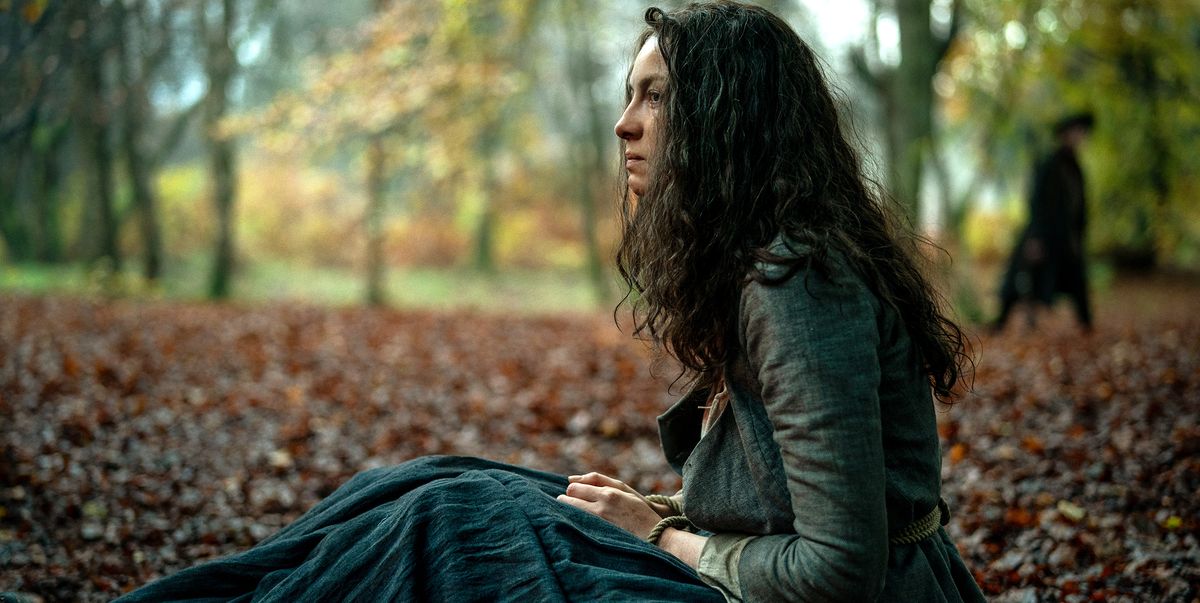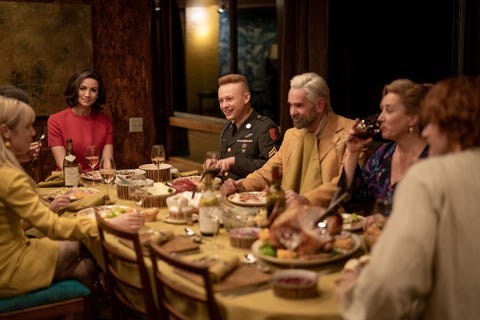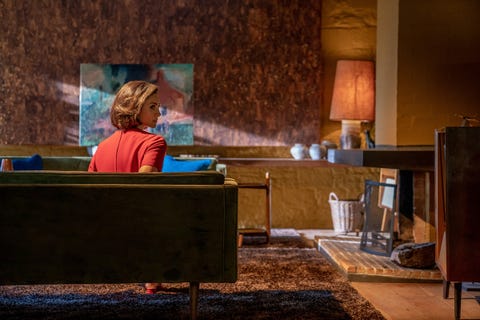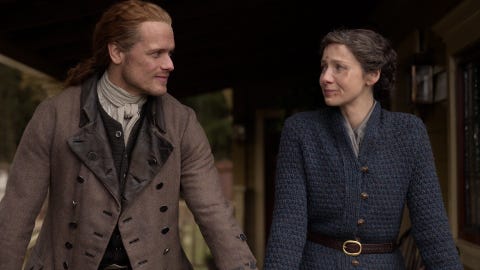Warning: This article features an in-depth discussion about sexual abuse. Reader discretion is advised.
Caitriona Balfe just chopped off all her hair.
No, literally—five minutes before we jump on the phone, the actress and producer posted a photo of the damage to Twitter, sending her half-a-million loyal followers into hysteria. There was no reason to worry, however—she looks amazing, as always. “It had to be done. It just did,” she jokes. “I was very tempted to order some bleach and then the person who cuts my hair was like, ‘Don’t you dare. You can cut it, but you’re not allowed to bleach it.'”
It’s a much-needed moment of levity before we delve into the horrors of Outlander‘s season 5 finale. Drawing from one of the book series’ most upsetting storylines, the episode tracks a brutal attack on Claire: She is kidnapped, beaten, and raped at the hands of men who despise her headstrong nature and intend to punish her for her influence on their wives. Claire is ultimately saved by Jamie (Sam Heughan) and her family, and they slaughter her attackers before taking her home to heal. But as she struggles to move on, her frustration boils over into a weeping outburst, which Balfe delivers with an urgent grace.
“She wants to be superwoman and to be able to say that this is not going to break her, but the whole point is that she doesn’t really have control,” Balfe explains. “This is something that’s going to take her own patience and the patience and love of her family to get her through this.”
Whereas Claire’s attack in the book feels random, the show takes pains to set it up as inevitable, and it’s careful to avoid gratuity. Here, Claire dissociates, entering a dream-like state where her family comes together to celebrate Thanksgiving in the ’60s. It’s a daring sequence that offers clever nods to longtime fans of the series while staying true to the horrific nature of Claire’s experience. “Claire is a voyeur of her own imagination,” Balfe says. “She’s trying to construct this beautiful family image that’s a safe place for her, but it’s never fully pure because you have Lionel bleeding in. No matter how much we are in this other world, I never wanted the audience to forget that it’s because something terrible is happening somewhere else.”
Along with Heughan, Balfe officially became a producer this season, and the stars’ influence is evident in these later episodes. Despite the tough subject matter, the finale feels like a true return to the spirit of early seasons. Though only 52 minutes, it feels feature-length, and hits all the beats of what makes Outlander so addictive, from unexpected action to quiet moments of intimacy. This can only mean good things for season 6.
Below, Balfe breaks down the nuances of the finale, how producing changed her perspective, and what’s next for Claire.
What did becoming a producer mean for you this season?
It was something I’ve been wanting for a while. There’s sometimes fear about actors who become producers—that they’re going to try to throw their weight around. For me, it’s an expansion of growing within this industry. I like to problem solve. I like to look around at what every single person is doing, and [ask], how can we make things better? Sam and I had such an intimate knowledge of the show and I thought we had a lot to offer and would provide a positive influence.
But it came very late—we got the approval right before we started filming. It was a bit of a learning curve. We weren’t really involved in the breaking of the scripts, and it was really toward the latter half of the season that we had the most influence, at least on the ground.
What did your influence look like on this finale episode?
Matt [Roberts, showrunner] came up with the idea that Claire would go into this dissociative state or go away somewhere—he didn’t want to stay with the rape. He thought it was a really horrific thing for an audience to sit through, which I agreed with, and he had this idea that Claire would go to the ’60s in her head. When he pitched me that idea in the beginning, I was really intrigued about it—exploring this psychological device that people need to protect themselves. Then it was a lot of work finding out what that would look like and getting the script to a place everyone felt comfortable with.
Despite how horrifying the subject matter is, this episode feels like a return to the ethos of season 1. There are moments of familial intimacy, and I appreciated getting a full episode devoted to Claire and her mindset.
It’s a testament to the writers. Last season was a difficult season for everyone. It was very transitory—we were in a new location as a show and there was a lot of forward momentum. We didn’t really get to sit and spend time with these characters, and the writers heard that. They worked hard this season, and Sam and I definitely pushed for more of these intimate-without-just-being-sexual moments. The intimacy of a marriage is so much more than just a sex scene. We were successful in finding some of those times.
In book five, there isn’t a whole [lot] of Claire in comparison to the other books. Her story is on the back burner a bit. I think this is part of the reason Matt and Maril [Davis, executive producer] decided to pull this storyline from book six. It’s a double-edged sword because of course, we want great material and something that really challenges you, but it’s really tough stuff and not something you relish doing or going through, especially when you’re so protective of your character. You’re like, “Do we really have to do this?” But it is part of Claire’s journey and we have an opportunity to do it with a lot of respect and give Claire as much agency as we could. What I’m interested in is how we continue on from this and explore her recovery, because that’s incredibly important.
These scenes made sense to me as a viewer, whereas they didn’t quite land when I read the book. The attack on the show feels inevitable because Claire has always been committed to using her knowledge from the future to help women. She sees it as her duty and wouldn’t regret it. Unfortunately, it feels unavoidable that men from this period, if they learned what she was doing, would want to “punish” her for giving their wives agency.
It’s a very different thing when you’re reading. You bring your own personal moral code or point of view, and your ability to digest certain types of information and situations. It’s completely unfiltered: It’s you and the book and the words and you can translate that whatever way you want. But when you’re adapting it, you’re presenting a certain point of view to the audience. You have to be really careful about where you’re standing. We talked a lot about the post-rape stuff with Claire and Jamie. In the book there’s a very animalistic sex scene which felt completely inappropriate to show, especially so quickly after something so horrific.
In the book that can work because when you’re inside someone’s head and you’re intimately connected to Claire’s thoughts, it’s exactly what she wants in that moment. But if you were to take a step back and do that as a TV show, the fact that Jamie would come in and be like, “Right, we’re going to do this”—it would never have worked. We tried as much as we could to take the core of Diana’s storyline and translate it in a way that worked for our characters but also for a modern audience.
Matt and I talked about how Claire’s held up as this strong woman and nothing really affects her—[that] she can plow through any situation and she’s completely indestructible. I thought it was very important to show that strength is not just about things not affecting you. She’s deeply wounded by all of this. [Seeing this onscreen] can allow us all to have more compassion for people who go through this.
What was the vibe on set while shooting episode 12?
I think it was very different for everybody else than it was for me. I kept separate from everyone, but Jamie Payne, who was our director for that block, was fantastic. So much credit has to go to him for having such a clear vision for this episode, especially visually. He and I worked closely together about how all this would be filmed. In the original script there was a lot more dialogue—even Claire had a lot of dialogue. I felt strongly that she shouldn’t speak in this creation of her own imagination. For me, when you dream, you never see yourself. You sense your words and your actions, but you’re never outside of yourself. I wanted this to be like that.
And the attention to detail is so impressive. I’m going to miss [production designer] Gary Steele’s work.
Me too. Personally and professionally, I adore him. His whole team is so bloody talented. That house was beautiful, but they completely redid it—they had this beautiful cork boarding with gold flecking on it that they put up on different walls. When you’re doing these surrealist, very emotional stylistic things, to be able to lose yourself in that is about having the visuals to surround and support you. Every single detail was perfect. He’s a genius and we’re very sad he’s gone.
What does this episode mean for season 6?
I enjoyed reading book six. It’s probably much easier to adapt than five was. Even though this has been a really strong season, the book itself was a tougher adaptation. For Claire, this is going to be an ongoing journey of recovery. She will probably try to plow on and get back to normality, but I don’t think she’s fully aware of just how difficult, subconsciously and psychologically, that’s going to be for her. Obviously, we have the war coming. There’s a lot happening on the horizon. I read two scripts already, and once we get back to filming, I think it’s going to be a strong season again.
Are you still learning new things about Claire, or approaching the role in a more experimental way?
It helps that we’re not just doing one thing. It’s evolved so differently over each season. I’m also constantly surprised by her. I loved that Claire is menopausal toward the end of this season—I advocated early on for much more of this. It’s a fascinating moment in a woman’s life to explore. I hope we can carry that into the next season because it has a huge impact on how you feel as a woman, about yourself and your family and your confidence.
Was there anything else you pushed for, like depicting the friendships between the women on the Ridge?
We constantly have to have this reminder that female friendships and female agency are vital. There’s always a danger when you’re doing a period piece that you go along with perceived knowledge, like, “That’s how history was.” No, that’s how we’ve been told history is. The people who get to write history are generally the dominant sex and culture and society. It’s always more interesting to present history in an honest way instead of regurgitating it. That’s something we always fight for: Let’s not do something because that’s what we’ve been told happens. Let’s find out what those people were actually experiencing and feeling.
I was definitely tearing up over the peanut butter and jelly sandwiches in episode 11. It really brought home that these people are making the best of a strange situation.
Diana [Gabaldon, the Outlander author] wrote that script. She has such an intimate knowledge of her characters and her world, that even though there’s a lot in the episode that moved away from the book, it’s still authentic and organic. That was one of the episodes where Sam and I had the least notes ever. It feels very true to the show. In Outlander, we do two things simultaneously: We create this homey, welcoming place for people to escape to, and yet we also show you very dark sides of humanity. It’s two hard sides of a coin to hold simultaneously, and we always have to balance one with the other.
Did producing change what your day-to-day looked like?
A little bit. You would have to problem-solve. Because we know the crew so well, when they were having issues they felt more inclined to be like, “We’re struggling with this. Can you help us?” Obviously our production team on the ground is amazing, but our writers and Matt and Maril are in L.A. most of the time. It’s good to have somebody on the ground that they know really well. And then going to production meetings was so fascinating. Everyone was like, “You don’t want to go to them. They’re so boring.” And we were like, “No, we do want to go.” I’m interested in producing stuff myself. I’m interested in creating content and seeing the building blocks that go into getting a script off the ground and all the people involved in making sure decisions are made at the right time.
What’s the first thing you’re doing when you get back to set?
Everyone’s trying to figure out what that’s going to look like. I miss everybody. I miss our crew. We’ve been having little Zoom drinks—myself, Maria [Doyle Kennedy], Lauren [Lyle], and Sophie [Skelton] had one last week. I would hate to think that this has become the new normal. To think we might be back on set and you can’t hug people…I’m hoping we get to a place where human contact is not something that needs to be feared. That’s a really horrible thing to imagine.
This interview has been edited and condensed for clarity.



